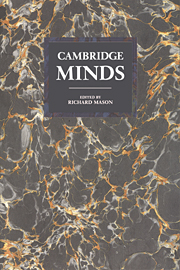Book contents
- Frontmatter
- Contents
- Notes on contributors
- Preface
- 1 The effects of a broken home: Bertrand Russell and Cambridge
- 2 I. A. Richards, F. R. Leavis and Cambridge English
- 3 Emily Davies, the Sidgwicks and the education of women in Cambridge
- 4 Radioastronomy in Cambridge
- 5 Three Cambridge prehistorians
- 6 John Maynard Keynes
- 7 Mathematics in Cambridge and beyond
- 8 James Stuart: engineering, philanthropy and radical politics
- 9 The Darwins in Cambridge
- 10 How the Burgess Shale came to Cambridge; and what happened
- 11 Ludwig Wittgenstein
- 12 ‘Brains in their fingertips’: physics at the Cavendish Laboratory 1880–1940
- 13 J. N. Figgis and the history of political thought in Cambridge
- 14 Molecular biology in Cambridge
- 15 James Frazer and Cambridge anthropology
- 16 Michael Oakeshott
15 - James Frazer and Cambridge anthropology
Published online by Cambridge University Press: 21 October 2009
- Frontmatter
- Contents
- Notes on contributors
- Preface
- 1 The effects of a broken home: Bertrand Russell and Cambridge
- 2 I. A. Richards, F. R. Leavis and Cambridge English
- 3 Emily Davies, the Sidgwicks and the education of women in Cambridge
- 4 Radioastronomy in Cambridge
- 5 Three Cambridge prehistorians
- 6 John Maynard Keynes
- 7 Mathematics in Cambridge and beyond
- 8 James Stuart: engineering, philanthropy and radical politics
- 9 The Darwins in Cambridge
- 10 How the Burgess Shale came to Cambridge; and what happened
- 11 Ludwig Wittgenstein
- 12 ‘Brains in their fingertips’: physics at the Cavendish Laboratory 1880–1940
- 13 J. N. Figgis and the history of political thought in Cambridge
- 14 Molecular biology in Cambridge
- 15 James Frazer and Cambridge anthropology
- 16 Michael Oakeshott
Summary
James Frazer is probably the most famous anthropologist – certainly the most famous British anthropologist, and quite probably the most famous anthropologist altogether.
His dates were 1854 to 1941. It was a very long life, a life that began deep in the Victorian Age, but lasting right into the Second World War. The dates are significant. To the outside world, he is still perhaps the anthropologist. Within the anthropological profession, his position is somewhat different. He is King Harold – the last king of the old regime – slain by the Conqueror. The Conqueror, in the case of the British social anthropological tradition, is a Pole: Bronislaw Malinowski. There is indeed a marked similarity between the Harold-to-William relationship, and that of James Frazer to Bronislaw Malinowski.
Before that particular great leap, we find quite a different kind of history. Real history, with a kind of continuous regime, where you can say what happened and who influenced whom, with a sustained interaction – a kind of continuous moral climate – and a continuous set of institutions – all that only visibly begins with Malinowski. Before him, it was all like a kind of Chinese painting, where the background is missing, and where you only get isolated images. There are indeed various figures which most people might have heard of: Tylor and Morgan, McLennan and Marrett, Maine and Robertson Smith. But precisely what the relationship between them is is not all that Clear.
- Type
- Chapter
- Information
- Cambridge Minds , pp. 204 - 217Publisher: Cambridge University PressPrint publication year: 1994



